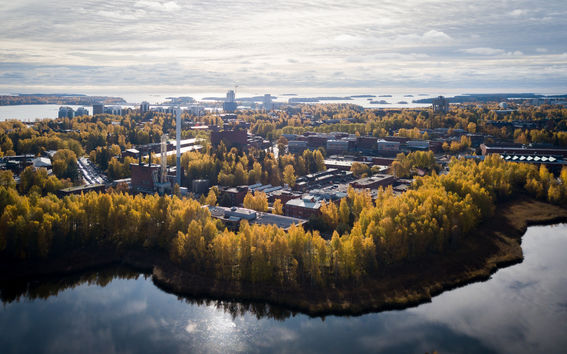Five new Marie Curie fellows join Aalto

The Marie Curie Action Individual fellowships are funded by the European commission, and are highly competitive. This year, five researchers from around the world have been awarded money to come to Aalto to study in groups in the School of Science and the School of Chemical Engineering. Details of their projects are listed below.
ENBIOMECH
Dr Sandra Kaabel in Professor Mauri Kostiainen’s group
Our project is developing new efficient and environmentally friendly methods to process biomass into products and innovative materials. The ENBIOMECH project will use mechanochemistry to develop improved methods for the preparation of cellulose nanocrystals (CNCs), CNC-based 3D nanoarrays and lignin nanoparticles (LNPs), which can be used in e.g. biomimetic tissues, medical or conductive materials, adhesives and coatings. Mechanochemistry is an approach where mechanical force is used to drive chemical reactions. Compared to the classical, solution-based methods mechanochemical approach can minimize or eliminate the use of harmful solvents, and reduce the energy used in the biomass processing.
WEARSENSNANO
Dr Basarir Fevzihan in Professor Jaana Vapaavuori’s group
Our project WEARSENSNANO is aiming to create wearable sensor system, that could be used for continuous monitoring of hypothermia in elderly people. Ageing makes the individual susceptible to hypothermia, as one’s body loses heat faster than it can be produced, and this may lead to a dangerously low body temperatures. Fevzihan’s solution would enable to care the elder people in private homes with the help of wearable sensors based on cellulose hydrogel and metallic nanowires, which measure ECG signal, skin temperature and muscle activities. The average age of the Europe’s population is increasing year by year, constantly growing the need for healthcare innovations in elderly care.
ROBOT Sensing
Dr Jacky Loo in Professor Anton Kuzyk’s group
Our project aims to overcome the barriers in reliable and sustainable fabrication of bio-nano-materials hybrid metasurfaces, i.e., nano-scaled patterns on a planar surface, by exploiting DNA nanotechnology, specifically, the DNA origami technique. DNA origami is the folding of DNA by the self-assembly of DNA strands bonded by intermolecular forces. This technique can produce complex structures with a highly accurate arrangement of various nano-scale components, including biomolecules and nanoparticles. It is also regarded as safe, low-cost and straightforward, and a potential alternative to the conventional lithography for a scalable nano-fabrication. Initially, our hybrid metasurfaces will be employed in nanobiosensing for rapid high-throughput disease screening. The sensor chip will be capable of simultaneously capturing multiple biomarker molecules of target diseases from the sample. Further integration with microfluidics and optical detectors will enable portable biosensing devices with significant potential for point-of-care diagnostics.
ConeOpsinsToPercept
Dr Gabriel Peinado in Professor Petri Ala-Laurila’s group
"If the doors of perception were all cleansed everything would appear to man as it is: Infinite" Romantic poetry (Sir William Blake), Sci-fi literature (Aldous Huxley) and rock music (The Doors) push me to understand how our sensory organs filter and select information from the otherwise infinite world that surrounds us: creating the reality that each of us inhabits. I started my career studying how isolated photoreceptor cells respond to light stimuli at the laboratory of Profs. Enrico Nasi and Maria Gomez. I then obtained my Ph.D. under the mentorship of Profs. Edward Pugh and Marie Burns investigating how photoreceptor cells, Müller cells and the Retinal Pigment Epithelium function together to mediate vision in the living eye. I am now excited to participate in the research program of Prof. Petri Ala-Laurila exploring how the information acquired by photoreceptors is encoded by the neural circuits underlying visual perception.
TEBLA
Dr Grazia Salerno in Professor Päivi Törmä’s group
Controlling and manipulating quantum matter is a fast-growing research topic that could influence many aspects of our daily life with a new technological paradigm. A promising step in this direction is to use topology – the study of quantities that are preserved under deformations – to tune the physical properties of matter. The discovery of topological insulators has given hints of novel possibilities to design a generation of fault-tolerant devices, that are unaffected by defects or perturbations. However, a lot more needs to be uncovered in topological quantum many-body systems at a fundamental level to achieve this. In my Marie Skłodowska-Curie fellowship, I will study how topology affects collective phenomena such as lasing. The project focuses on topological lasing in nanoscale photonic systems: this could lead to new miniaturized light sources with bright coherent beams whose important properties are made particularly robust by utilizing topological concepts. My work is theoretical, and will be directly relevant for the experiments performed in my host group (Academy Prof. Päivi Törmä), so any new findings can be readily tested.
Read more news

Apply Now: Unite! Visiting Professorships at TU Graz
TU Graz, Austria, invites experienced postdoctoral researchers to apply for two fully funded visiting professorships. The deadline for expressions of interest is 20 February 2026, and the positions will begin on 1 October 2026.Soil Laboratory Exhibition – Exploring the Dialogue Between Human and the Earth in Utsjoki
Soil Laboratory explores the relationship between humans and the earth as a living landscape through ceramic practices in Utsjoki.
The Finnish Cultural Foundation awarded grants for science and art
A total of 15 individuals or groups from Aalto University received grants






